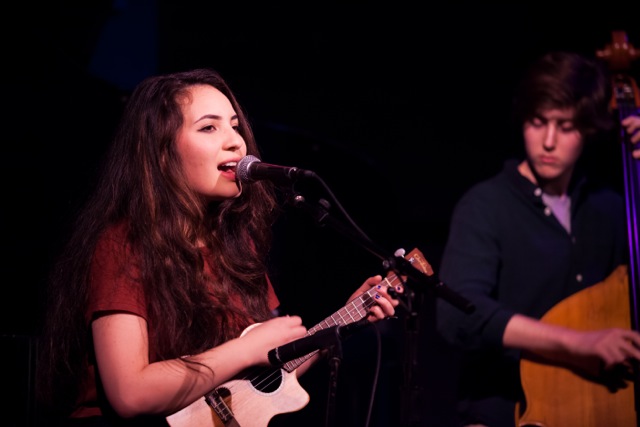

On Sunday, I was the recipient of a delightful, surprising treat. Nina Shallman ’18 performed a solo show at Northampton’s Iron Horse Music Hall. She performed 10 songs, some from her own repertoire, on piano and two types of ukuleles, alongside her cousin Aaron Blick on bass.
I knew Shallman only by her face — from the posters I could tell that I had seen her around campus and the music venues of Northampton. She is a member of the Bluestockings all-female a cappella group, and was one of the representatives of Amherst College in the Five College PoetryFest earlier this school year. Shallman’s original song “Daisies” has been added to the trackl ist of WMUA 91.1 Amherst, MassLive recently interviewed her, she performed two sold-out shows at The Mint in Los Angeles, and she has more than 3,600 likes on Facebook (quite a notable fan base).
The Iron Horse has a rustic, homey, decor — the elevated stage, complete with an impressive dark grand piano, drew the attention of the crowd. Shallman fit right in. She climbed onto the stage of the Iron Horse, a typical college student, to accept her place under the pink tone of the stage lights, with her cousin and a huge dusty orange bass close behind.
What is most jarring, surprising and awe-inspiring about Nina Shallman is her voice. I can use endless analogies to describe the tone: like smoke, like Chicago, like it belongs on a toned dark stage. Her voice possesses a lack of effort while sounding so gorgeous, like soft warmth and comfort. She sings casually, as if it is normal to sing that ethereally. She sings like there is always something more powerful to her voice that she chooses not to use — and when she does display the full power, oh wow, there she goes.
“Nina Shallman has such a lovely voice, it almost doesn’t matter what she’s singing,” LA Weekly’s Falling James wrote. Her voice’s breathy richness is only augmented by how close her lips are to the piano’s microphone, with every hitch, exhale and change of her breath reverberating throughout the hall. The minimalist piano that she plays, with simple chords, only help draws more attention to the richness of her voice and the melody she produces. The bass provides a fitting, deeper accompaniment to the sound of Shallman’s voice and piano. The dimension of the sound was sparse in terms of instrumentation, but what was there was definitely rich.
Her set for the night consisted mostly of her own songs — soft, romantic ballads that break hearts with a couple notes, a few croons and simple couplets of controlled emotion. The original songs definitely stood out because the subject matter — deep, heartfelt, aching emotions — fit her voice well. The lyrics definitely stand out with their poignant, romantic tone, and they fit with the pondering notes of the music remarkably well.
“Silver lie, and I want to pray/ I’d kiss you tonight if I head back yesterday/ I want the sun to go away, but the moon can stay,” she sings with the slowly growing piano chords in “The Moon Can Stay.” In “Marionette,” she explores the symbolic unbalanced relationship between puppet and puppeteer with lines like, “You pull the strings in this uneven duet.” “Nice to Hear,” a quaint ukulele ballad, tells the story of a girl who can’t let go “of the pessimist” in her. The opening notes allow the audience to imagine a love scene: “You say you need me, and hold me close/ Whisper ‘never let me go’ in my ear/ but I don’t buy it, but still can’t deny that it’s nice to hear.”
The chorus of my personal favorite, “Daisies,” goes, “And you say our time is ticking, ticking, ticking/ and you say that your heart is kicking, kicking, kicking,” and while the rest might not be perfectly comprehensible, it has such a satisfying effect with the music and the quality of the singing voice.
Even her covers stayed true to her strengths — she brought new life to the songs. Her cover of the Smiths’ “Ask” set her steady, calm voice over an upbeat ukulele, and it was hard not to nod along with the beat. Her banter with the bass performer, Blick, added a lighthearted tone to the set.
“Hopefully this tuning goes well,” she said as she tuned one of her three finicky ukuleles. “Hopefully,” he responded.
The music hall applauded her performance with much love — to the surprise of Shallman and Blick.
“Aw, we didn’t think you guys would like us!” she laughed from the stage. I can easily say that will never be a problem for this performer; on stage and off, it is hard not to appreciate Nina Shallman.